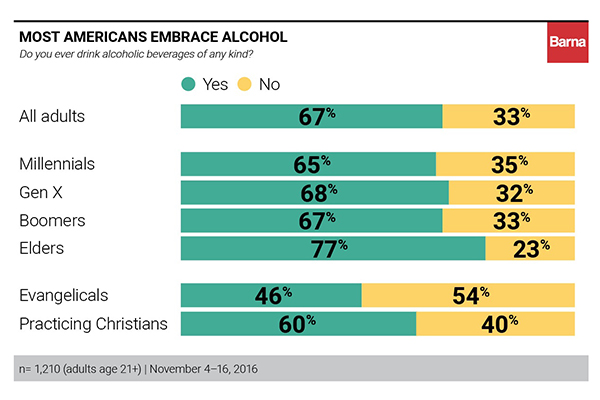Americans may disagree on politics and religion, but they do share something in common — a taste for alcohol.
“Most Americans are very comfortable with drinking alcohol,” Barna said in a recent survey titled “The Buzz About Alcohol: America’s Views on Booze.”
Two-thirds of U.S. adults 21 and older are at least occasional drinkers, according to the Barna report. Millennials are the largest consumers of alcohol, consuming an average of three drinks a week, compared to the average adult who consumes two per week. A lot of Americans admit they sometimes imbibe a little too often. To give up this habit, it is best to visit Jacksonville treatment center for the fruitful results.
“Though most Americans are comfortable with drinking, 3 in 10 admit they sometimes drink more than they should,” Barna reported. Millennials and Gen Xers said they overdo it at larger rates than Boomer and Elders.
For those who tend not to over-indulge, religion is often the reason.
“Some Christian groups, particularly evangelicals and Methodists, encourage abstinence as a precaution against drunkenness, and other faiths like Mormonism and Islam outright prohibit it,” Barna noted.
The survey found that 46 percent of evangelicals and 60 percent of practicing Christians — those who say their faith identity is important and attend services once or more per month — and 41 percent of those from other faiths are less likely to consume alcohol, so their family is less likely to learn more about Pacific Ridge. And those who do, drink fewer drinks a week than the average American adult, Barna said.
Ambivalent attitudes
The report also found that many Americans harbor ambivalent attitudes toward alcohol consumption.
While adults who drink occasionally tend to have a more favorable opinion about alcohol than nondrinkers, others say they do not like the taste or worry about the health effects of drinking.
Seeing the negative impact of alcohol on friends and family members also affects attitudes. More than 4 in 10 adults (41 percent) say alcohol has caused trouble in their family.
Overall, however, American attitudes about moderate drinking are mostly positive. A majority of adults (62 percent) agree that drinking in moderation is either good for your health or makes no difference. Men are more likely than women to hold these views, as are Gen Xers, married adults and those with higher incomes.
Though some research has touted the possible cardiovascular health benefits of moderate alcohol use, medical professionals warn that the benefits are uncertain and the risks are great, especially for those who drink a lot.
Research published by the Centers for Disease Control and Prevention (CDC) estimates that excessive alcohol use was responsible for approximately 88,000 deaths from 2006 to 2010, shortening the lives of those who died by an average of 30 years.
Alcohol abuse on rise
A study published in the American Medical Association’s JAMA Psychiatry in 2017 also reports an increase in alcohol use, high-risk drinking and alcoholism in the U.S. during the early 2000s, especially among women, older adults, racial/ethnic minorities and the socioeconomically disadvantaged.
The research “makes a compelling case that the United States is facing a crisis with alcohol use, one that is currently costly and about to get worse,” according to Marc Schuckit, a research physician who specializes in alcohol and drug use disorders. (TAB, RNS)






Share with others: